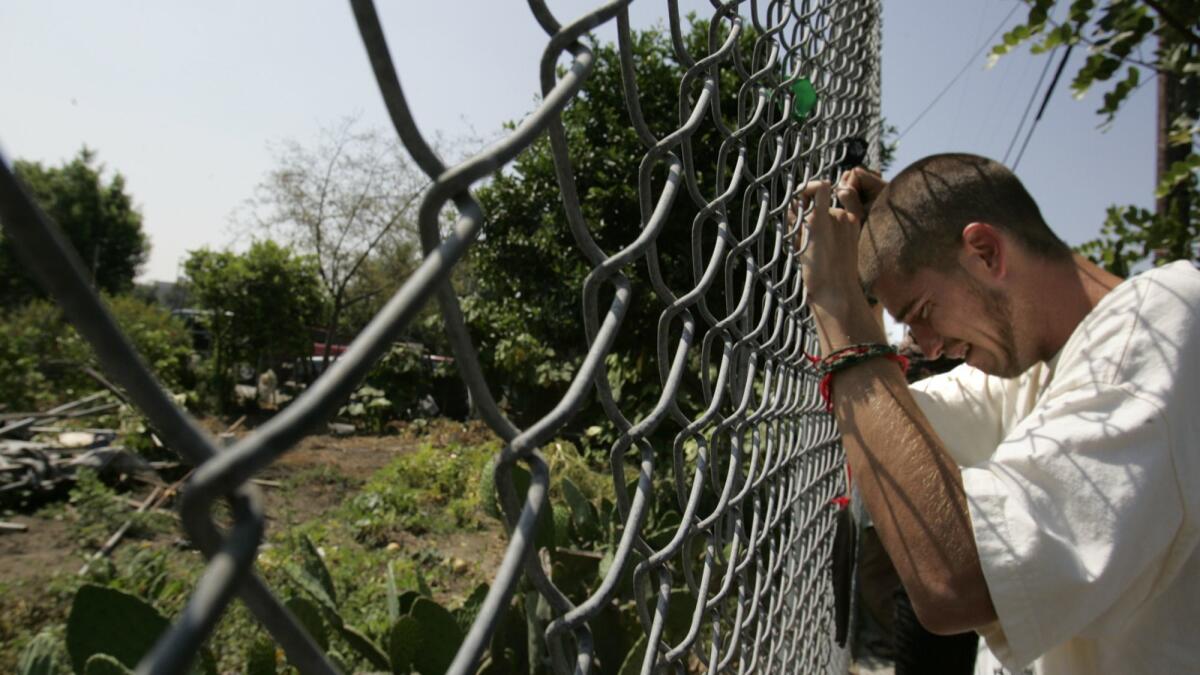Urban farmers haven’t given up in their fight to protect a South L.A. site from development

Twelve years ago, protesters were ejected from a plot of land in South Los Angeles that had become one of the biggest urban farms in the country.
Now farmers and activists say a court ruling has given them fresh hope in their battle against plans to build warehouses and offices on the Alameda Street site.
Urban farmers and the South Central Farmers Restoration Committee had sued the city, arguing that it violated the California Environmental Quality Act in multiple ways when it approved plans to erect four industrial buildings on the land. On Thursday, a Los Angeles County Superior Court judge ruled that the city needed to do additional analysis on how the project would affect traffic.
Attorney Mitchell Tsai, who represents the farmers, said the decision would give the group a new chance to challenge the project at City Hall.
“It brings us back to the table,” said Alberto Tlatoa, a committee member whose family had long tended a plot on the farm. More than a decade after the farmers were booted off the property, Tlatoa said, “we’re still committed to this issue because South-Central needs urban farms.”
City officials seemed unfazed by the decision. “Today the city prevailed on all but one ground and we believe we can easily comply with the court’s direction on the one remaining issue,” Rob Wilcox, a spokesman for City Atty. Mike Feuer, said in an email Thursday.
Wilcox said the city was still assessing whether the industrial project would have to be approved again by the City Council. Attorney Patrick Perry, who represents site owner PIMA Alameda Partners, did not respond to messages seeking comment.
The South Los Angeles site has a long and tumultuous history. Decades ago, the city obtained the land through eminent domain to build a trash incinerator, a plan that was scrapped in the face of community opposition. Instead, it became an urban farm where hundreds of families could tend fruit trees and vegetable gardens.
After a legal battle, the land ended up back in the hands of the former owner, who refused to sell it to the farmers following a public uproar over the site. Dozens of people were arrested on a summer day as protesters who had bound themselves to trees and concrete-filled drums were forcibly removed from the property.
Then, for years, the land sat empty. Plans to build a Forever 21 warehouse and distribution center, which had drawn protests from farm supporters, didn’t move forward. The site was eventually sold to PIMA Alameda Partners, which received approval last year to turn it into an industrial park for garment manufacturing.
In letters to the city, the owner’s attorney said the plan would help the community by creating manufacturing jobs on an “underutilized industrial property,” and fell in line with city goals of retaining industrial space. PIMA and the city wrote in court filings that opponents were lodging objections to the project “in hopes of restoring an urban farm on industrially zoned land that they do not own.”
In the broiling heat, dozens of farm supporters clad in green shirts gathered Thursday outside a downtown courthouse, chanting “Save the farm!” They hoisted signs pleading “Farm Over Profit” and “Bring Back Our Space” and held up a painted banner depicting golden rays of sunshine, ripe vegetables, and the slogan “We are still here.”
Rosa Romero, a member of the South Central Farmers Restoration Committee, recounted memories of the farm as a lush patch of greenery in the middle of the city, a gathering spot with art, workshops and youth programs where children learned to identify herbs and plants. The warehouses could be built somewhere else, she argued.
“This piece of land is just so important to us,” Romero said. “And that’s why it’s 12 years later and we’re still fighting.”
Twitter: @AlpertReyes
More to Read
Sign up for Essential California
The most important California stories and recommendations in your inbox every morning.
You may occasionally receive promotional content from the Los Angeles Times.











